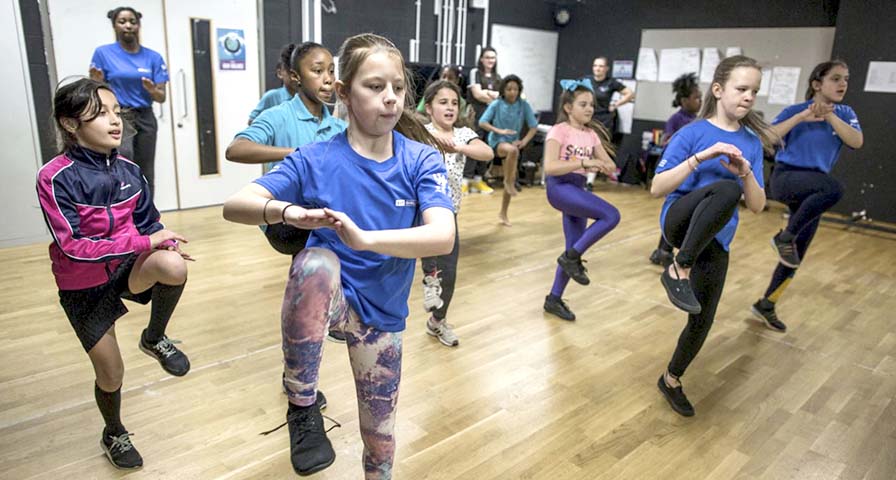Originally published May 15, 2019 in The Telegraph.
By Jeremy Wilson
A decisive majority of the general public want more physical activity in schools and would support enhancing physical education to core subject status, according to new research commissioned by the Youth Sports Trust.
The major survey of adults, of whom many were parents, demonstrated a clear national belief in the wide-ranging benefits of sport and also only limited support for cutting PE in schools to allow for additional tuition in the three core subjects of English, maths and science.
Although sports minister Mims Davies has said that the development of physical literacy in schools should be placed on a par with reading and maths, schools are at liberty to decide how much time is dedicated to PE. Research last year reported that 38 per cent of secondary schools have cut their PE time in the last five years for children aged between 14 and 16 amid the pressure of exams and core subjects.
The teacher workforce census also showed that the number of hours taught in PE to pupils in state-funded secondary schools had dipped by more than 50,000 from 333,800 in 2010 to 282,200 in 2017.
This new research, which was undertaken by YouGov last month and follows the launch of The Telegraph’s “Girls, Inspired” campaign to tackle a national crisis of inactivity that is especially acute among girls, shows just how much PE is valued by the general public.
Almost two thirds of respondents “strongly or tended” to agree that PE should be a core subject in the national curriculum, with 80 per cent agreeing that there should be more opportunities for young people of all ages to be physically active at school. Only 26 per cent thought it was right for children to be taken out of PE for added tuition in the core subjects.
An appreciation of the multiple benefits of PE was also striking. Almost two-thirds thought that it improved children’s academic performance; 82 per cent said that it improved a child’s mental wellbeing; almost 90 per cent saw the physical benefits; and 80 per cent thought that it aided social wellbeing.
Around 38 per cent thought there was enough time already for PE against 24 per cent who did not – although the Government’s two-hour recommendation is only a curriculum guideline and not actually delivered in a significant number of schools.
“Our new research has shown that the public’s recognition of PE’s importance is not being reflected in its place in the curriculum or potential contribution; this is something that needs to change,” said Alison Oliver, chief executive of the Youth Sports Trust. “There can be no disagreement that as a nation we aren’t getting it right for children, and too many of them are not gaining the life-changing benefits of sport and play.”
Almost 16,000 people have now signed a petition launched by Eartha Pond, a former professional footballer and now teacher and councillor, that calls for PE to be made a core subject with a mandatory minimum of two hours per week. In its formal response to her petition, the Government said that it had set an ambition, as part of the Childhood Obesity Plan, for primary pupils to be given the opportunity to do 30 minutes of the recommended 60 minutes of physical activity each day while at school.
However, they also said that they had “no plans” to change the PE curriculum requirement. “It is up to schools to decide which sports or physical activities they choose to teach,” said the government statement.
It also cited how the teacher workforce census showed that only the three existing core subjects had more time devoted to them, although PE still lagged well behind the combined total of more than a million hours for English and maths.
“We will publish a School Sport Action Plan later this year to support schools in tackling the challenge of inactivity in our children and young people,” added the government statement. “It will set out further steps to support schools to train their teachers to deliver high quality provision.”
As well as the data showing that children were receiving less PE, Oliver highlighted Sport England’s Active Lives survey which showed that 80 per cent of young people fail to meet the recommended daily activity level.
“As a country, we would not accept this sort of decline in English and maths,” said Oliver. “We should treat with no less urgency the need to transform and improve young people’s physical education.
“The government’s minister for sport recently declared that the development of young people’s physical literacy should be put on a par with literacy and numeracy in education. It will be absolutely essential that the government’s School Sport Action Plan sets out a long-term, joined-up approach which delivers on this promise.”
Sport England yesterday welcomed the expected greater focus on physical activity by Ofsted inspectors but also want to see PE given an enhanced status.
“Our research shows that young people who are active report higher levels of happiness, are more trusting of other children and have higher levels of resilience,” said Mike Diaper, executive director of children and young people. “Add that to the wealth of evidence that shows that active children can have higher levels of academic attainment, concentration and better attendance and it’s clear that PE should be given the same priority as core subjects such as maths and English.
Seeking IHT Spirit System information?





